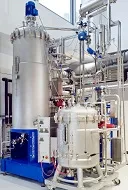
The high selectivity of enzymes is the main reason for industrial interest in the application of biotechnological processes for the production of chemicals. In the case of syntheses containing many steps the use of whole cells is advantageous because isolation and purification of single enzymes become gratuitous. However, this embeds the production of the desired molecule in the cell’s global metabolism. A quantitative comprehension of metabolism is thus necessary to optimize the synthesis of the targeted product.
The aim of this project is the metabolic in vivo analysis of varying recombinant microorganisms designed for the production of metabolites in order to identify limiting steps in metabolism in fed-batch production processes.
To achieve this, cell samples are taken at several times during the fed-batch processes. These samples are used to perform parallelized metabolic analyses of the producer cells and thereby gain knowledge about the cells’ metabolic performance. Intracellular carbon fluxes and concentrations of metabolites are measured within a few minutes after provision of different carbon sources in short-term perturbation studies. The quantified metabolic performance is then analyzed thermodynamically and mathematically to identify limiting sections of metabolism.
Publications
- Caballero Cerbon DA, Gebhard L, Dokuyucu R, Ertl T, Härtl S, Mazhar A, Weuster-Botz D (2024): Challenges and advances in the bioproduction of L-cysteine. Molecules 29: 486.
- Caballero Cerbon DA, Widmann J, Weuster-Botz D (2024): Metabolic control analysis enabled the improvement of a L-cysteine production process with Escherichia coli. Appl Microbiol Biotechnol 108: 108.